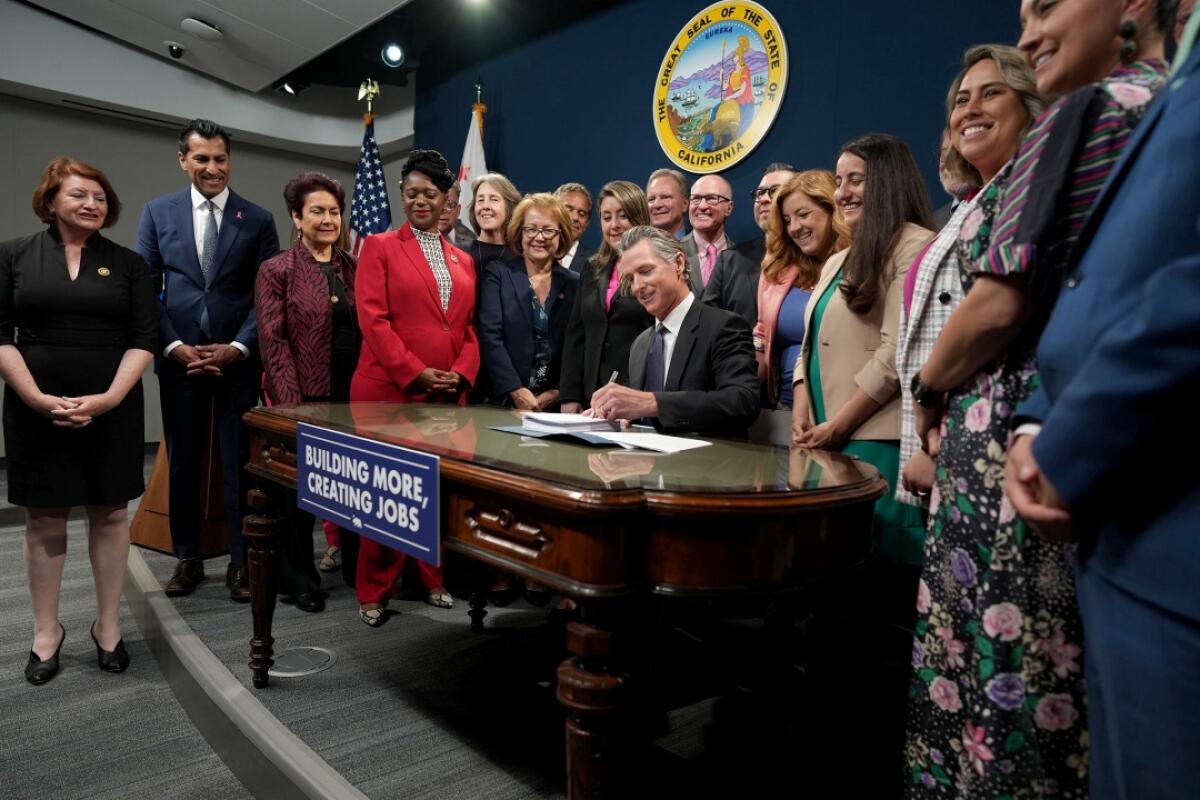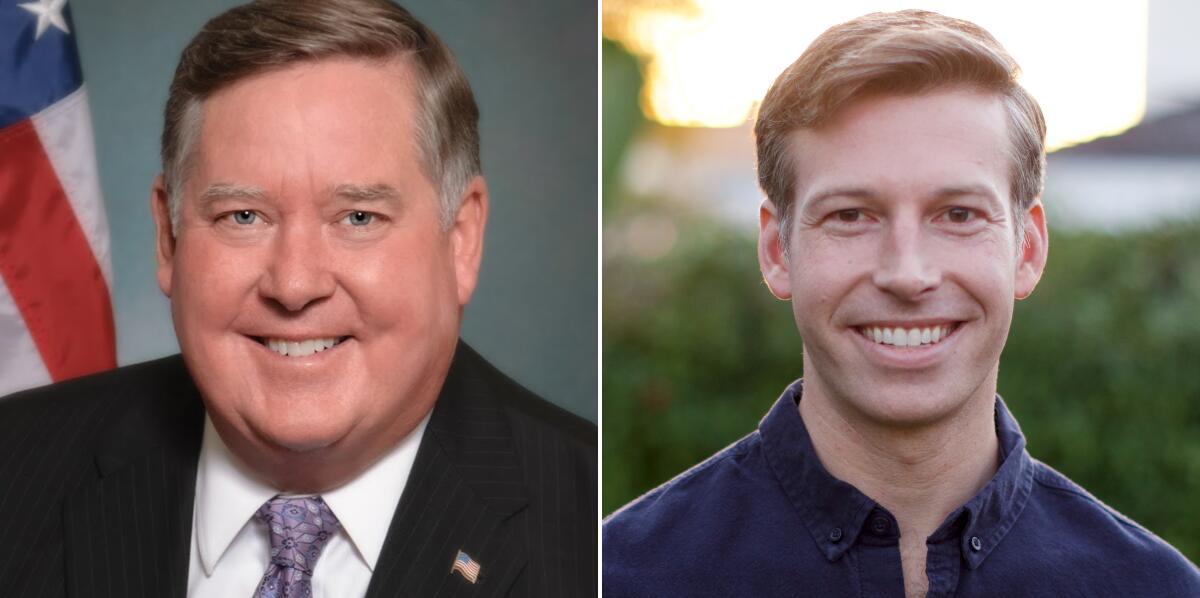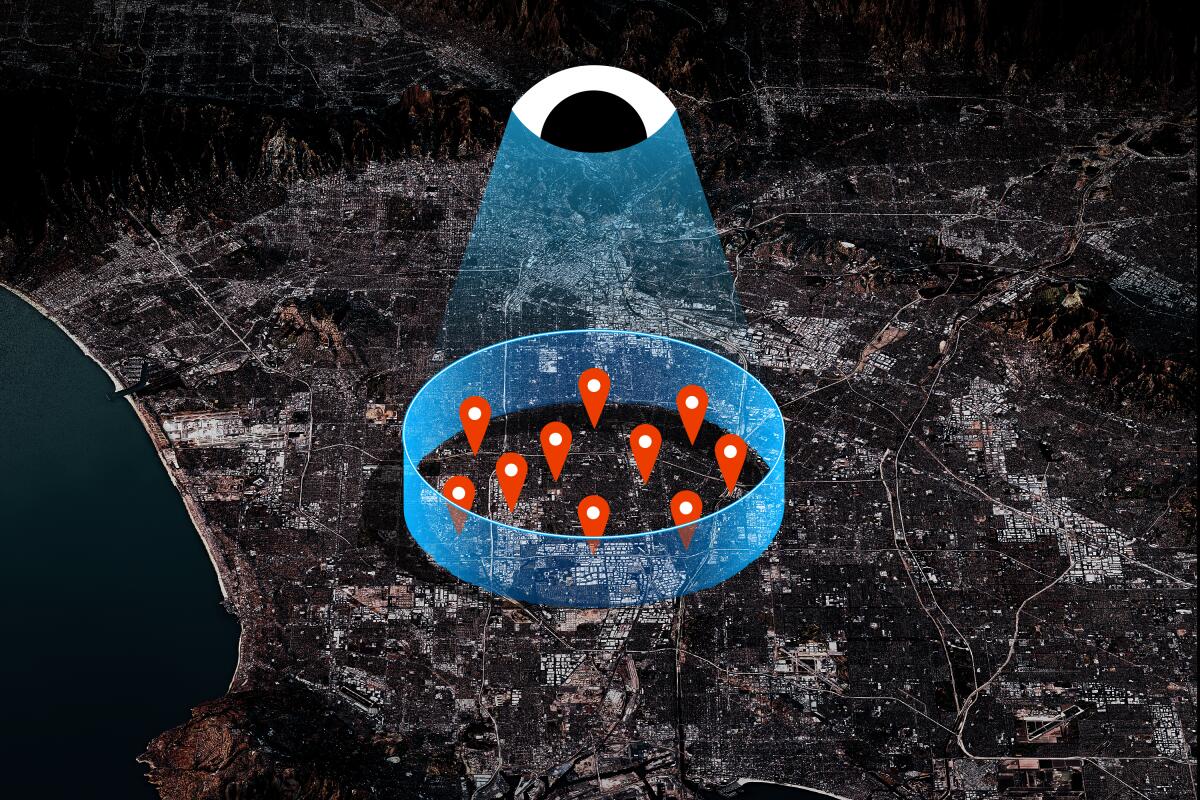California Politics: How Gavin Newsom wields his power at the Capitol

SACRAMENTO — It was just for a brief moment, but Gov. Gavin Newsom seemed to go off script during a news conference earlier this month with Democratic lawmakers to celebrate signing several infrastructure bills that he sprang on the Legislature in the 11th hour of the budget process.
“The process is always tough and I recognize I don’t necessarily always make it easy,” Newsom said, prompting a few audible harrumphs from the lawmakers standing next to him on stage.
“You weren’t supposed to snicker,” Newsom added.
Though said in jest, the governor was alluding to an uncomfortable reality, Times reporter Taryn Luna writes in this insightful analysis of how Newsom wields his power in the statehouse. Despite coming together for a photo opportunity that day, Newsom’s approach isn’t endearing him to interest groups or his Democratic colleagues. As Luna explains:
“The policy trademark of California’s 40th governor has become increasingly apparent in his second term. Newsom has a penchant for publicly manufacturing a sense of urgency and giving lawmakers as little time as possible to act.”
Three instances in the last year illustrate this pattern, which you can read more about in this article: Newsom’s signature move at the California Capitol: Jam the Legislature.
I’m Laurel Rosenhall, The Times’ Sacramento bureau chief, bringing you the week’s biggest stories in California politics.
LGBTQ+ culture wars in a key House race

What could have been a routine vote in Congress to approve transportation funding has become a culture war flash point in one of the nation’s most competitive House races — the fight for a Riverside County seat that Democrats are working hard to flip, writes political reporter Seema Mehta.
GOP Rep. Ken Calvert was among the House Republicans who voted last week to yank funding from three LGBTQ+ community centers in Massachusetts and Pennsylvania, handing his challenger, Democrat Will Rollins, an easy attack line in the race to represent a district with one of the largest concentrations of LGBTQ+ voters in the nation.
Calvert responded with an attack of his own: Pointing out that one of Rollins’ campaign donors had mingled with Jeffrey Epstein, the wealthy financier accused of sex trafficking involving dozens of teenage girls before he died in a New York City jail cell in 2019 in what was ruled a suicide.
Ugly personal attacks are nothing new in Calvert’s congressional races. In fact, they date back decades. But his district has shifted from red to purple, making this contest one of several in California that could determine which party controls the House.
Lawmakers eye police warrants for Google data

An unusual thing happened in Sacramento recently: Big Tech companies and privacy advocates agreed on a piece of legislation.
Though usually at odds, the two sides agreed that California should restrict police from using an increasingly common type of warrant in which they turn to Google for the cellphone data of everyone who was in the area where a crime occurred.
But the bill stalled amid heavy pushback from law enforcement agencies. What happened?
Our tech policy reporter Queenie Wong explores the debate over the exploding use of so-called geofence warrants: Law enforcement leaders see Google location data as essential for solving crimes, but civil rights groups fear such warrants will infringe on the privacy of innocent bystanders.
Wong reports that the number of geofence warrants Google says it’s received from U.S. law enforcement increased from 982 in 2018 to 11,554 in 2020. California lawmakers and advocates are still negotiating to try to come up with a new version of the bill that could pass next year.
Enjoying this newsletter? Consider subscribing to the Los Angeles Times
Your support helps us deliver the news that matters most. Become a subscriber.
Keeping up with California politics
Newsom’s plan to transform San Quentin prison moves ahead despite lacking details
After initial fanfare over Newsom’s proposal to overhaul California’s oldest prison, lawmakers, prison closure activists and the Legislature’s own nonpartisan financial advisors grew increasingly alarmed over the plan’s murky details, rushed timeline and high price tag.
Column: A massive borrowing binge is brewing in Sacramento
Left to their individual desires, California legislators would go on a massive borrowing binge, writes columnist George Skelton. They’d sell bonds to fund construction of homeless housing, flood control projects and classroom updates. But should these projects be paid for with borrowed money that, with interest, roughly doubles the project cost? Or should they be financed with cash out of the state banking account, the general fund?
California Democrats ramp up pressure on Hollywood studios over actors’ strike
Democratic members of California’s congressional delegation, increasingly concerned about the ongoing strikes in Hollywood, are warning studios that they are watching. “The contributions of these artists are indispensable to productions that millions of Americans watch each year,” 37 House members from California wrote in a letter to the heads of the unions and the studios.
The GOP and the NRA want to stop gun violence research. California is a target
California is the epicenter of American gun violence research, largely because it maintains an extensive repository of firearms data and, unlike other states, has historically made much of the data available to scientists studying the root causes of gun deaths. Now a lawsuit brought by gun-rights activists threatens that longstanding data infrastructure, and research funding is under threat from House Republicans.
Shasta supervisors declare county a 2nd Amendment fortress in ‘war on guns’
After gaining national attention for dumping Dominion Voting Systems and becoming the largest entity in the United States to resort to counting ballots by hand, the Shasta County Board of Supervisors has waded into another issue roiling right-wing America: an unwavering defense of gun rights. This week, the board approved a resolution declaring that the county would “use all lawful means at its disposal to support and defend the Second Amendment.”
A politician’s downfall reveals a Disney exec and a secret ‘cabal’s’ power over Anaheim
The role of powerful business interests in Anaheim — home to Disneyland Resort and Angel Stadium — has come under renewed scrutiny amid an ongoing federal corruption investigation that became public last year. A new investigation by The Times provides a rare look inside the extraordinarily cozy relationships lobbyists and corporate power brokers enjoyed with an Anaheim City Council member.
Column: It’s simple — peddling children for sex is serious
The hardball game of lawmaking can be simple, writes columnist George Skelton: “If a pimp is peddling children for sex — supplying kids for pedophiles — it’s a serious crime. No ‘ifs’ or ‘buts.’ You got it, Democrats?”
Stay in touch
Did someone forward you this? Sign up here to get California Politics in your inbox.
Until next time, send your comments, suggestions and news tips to capolitics@latimes.com.
Sign up for Essential California
The most important California stories and recommendations in your inbox every morning.
You may occasionally receive promotional content from the Los Angeles Times.




